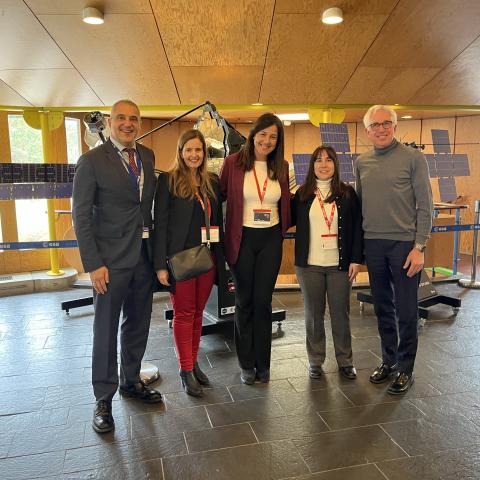
Our colleagues at the European Space Agency's Research, Development and Technology Centre in Noordwijk, Netherlands
The experts in Aviation Safety, Marisol de Mena and Ángela Abad, together with the manager of the Europe, Africa, Asia and Oceania Aviation Account Deputy Directorate, Carolina Ajates, presented the final report of the project that Ineco is developing to apply its human factor methodology to two operational scenarios of Galileo, the European satellite radionavigation and positioning system developed by the European Space Agency (ESA).
Our colleagues have explained at the ESA Research, Development and Technology Centre in Noordwijk (The Netherlands) the main milestones achieved so far in the project and the evidence found in the analyses carried out, including the identification, prioritisation and approach of the scenarios analysed, together with the most significant human errors identified in relation to the tasks, their causes and effects and their criticality. In addition, specific mitigation measures have been proposed to pro actively reduce the likelihood of human error during execution and/or the severity of its impact on the day-to-day work of these operators, and recommendations and next steps have been proposed to further deepen and work on the contribution of the human factor within the Agency.
This work is based on the FARHRA (Feasible Action Rules for Human Reliability Assessments) methodology, developed by Ineco and winner of the CANSO Global Safety Achievement Award in 2019. It recognises the substantial role of the human factor which, according to safety studies, is responsible for 80% of accidents and failures. The methodology covers the analysis of a wide range of elements, including roles, responsibilities, procedures, equipment, tools and the working environment. By accumulating knowledge about operational scenarios, the methodology allows for a comprehensive assessment of how human performance impacts safety and efficiency.
The presentation was very well received by a large ESA audience, who also appreciated the added value provided by Ineco, given its extensive experience in safety and human factors in different fields, such as aeronautics, aerospace and railways. Areas for which the methodology has been adapted, adjusting it to the critical tasks and errors that are particular to each sector.








